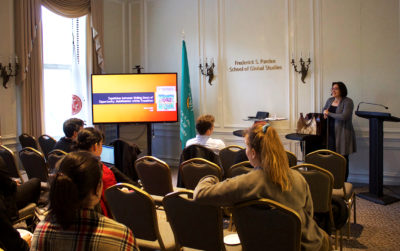
The Frederick S. Pardee School of Global Studies hosted María Inclán, a political science professor from Mexico City, to discuss her research on the Zapatista movement and Mexico’s democratic transition on Thursday night.
Approximately 20 people attended the talk titled “Zapatistas Between Sliding Doors of Opportunity: Mobilization within Transition” organized by Pardee’s Latin American studies department.
The Zapatista movement encompasses the Zapatista Army of National Liberation, a left-wing revolutionary political group based in Chiapas, Mexico, Inclán explained. The main body of Zapatistas is made up of rural, indigenous people of Mexico and consists of about 5,000 people. According to Inclán, in 1994, the group declared war against the Mexican state.
Inclán is an associate professor of political science at the Centro de Investigación y Docencia Económicas, the school’s Center of Economic Research and Teaching, in Mexico City. Her research studies the link between social movements and democratization.
During her presentation, she discussed her point of view that the political climate in Mexico contributed to the demise of the Zapatista movement.
“The unexpected failure of the Zapatista movement forces us to wonder why an indigenous insurgent movement that was poised to succeed, given its timely emergence on a domestic and international audience, failed to become an impressionable police player and achieve its goals,” Inclán said. “I believe the answer to this question lies in the changing political conditions in which the Zapatista movement emerged and developed.”
Inclán’s argument was centered around what she called a “sliding door analogy.”
“I argue that the Zapatista movement developed within simultaneous openings and closings of political opportunities for its mobilization, success and survival,” Inclán said. “The Zapatistas got caught between sliding doors for opportunities for mobilization and success.”
David Carballo, a Boston University professor in the archaeology department and one of the organizers of the event, said he invited Inclán to speak not only because he was familiar with her work, but also because the history of the Zapatista movement is still relevant today.
“It’s fascinating that there are reverberations [of the Zapatista movement], today especially relating to NAFTA,” Carballo said after the talk. “So, because of the Trump administration, we’re starting to rethink NAFTA and the Zapatista uprising coincided with … the taking into effect of NAFTA on Jan. 1 of 1994.”
Carballo said that he thinks Inclán’s talk allowed students to learn about a social movement that took place before many of their lifetimes.
“[Inclán offered] a perspective of when it started, what were its successes and what were possibly it’s failures,” Carballo said. “Some of the ways it just couldn’t advance and so in thinking about any sort of movements of today … how do they build steam and how do they lose steam? And having a 20-25 year perspective on that gives you some insight into what works and what might not.”
Several students in attendance were from the protest and resistance in the Americas class taught by history professor Jeffrey Rubin. They said they attended the event because they have been studying the Zapatista movement in their class and enjoyed hearing about Inclán’s expertise.
Jess Nario, a College of Arts and Sciences senior, said Inclán’s discussion expanded on what she had learned about the movement in class.
“It was really interesting to hear about the Zapatista movement from a more chronological sense,” Nario said. “[In class] we learned about it in the effect it had and this was more about the historical context.”
Aelish Benjamin-Brown, a CAS senior, said that Inclán provided a fresh perspective on the Zapatista movement relative to social movements existing today.
“[Inclán] was talking about the modern movement today, and the discussion about what their motivations are today and what their whole goal is — is it political, is it survival?” Benjamin-Brown said. “That debate was something that I find very interesting.”
Madeleine Ferrill, a junior in CAS, said she enjoyed hearing about the Zapatista movement’s current political pursuits.
“It was interesting to hear about their re-entry into the political sphere and how they have a candidate,” Ferrill said.” We were looking at a lot of history [in class] so we didn’t really take it into the modern day, so that was interesting.”















































































































